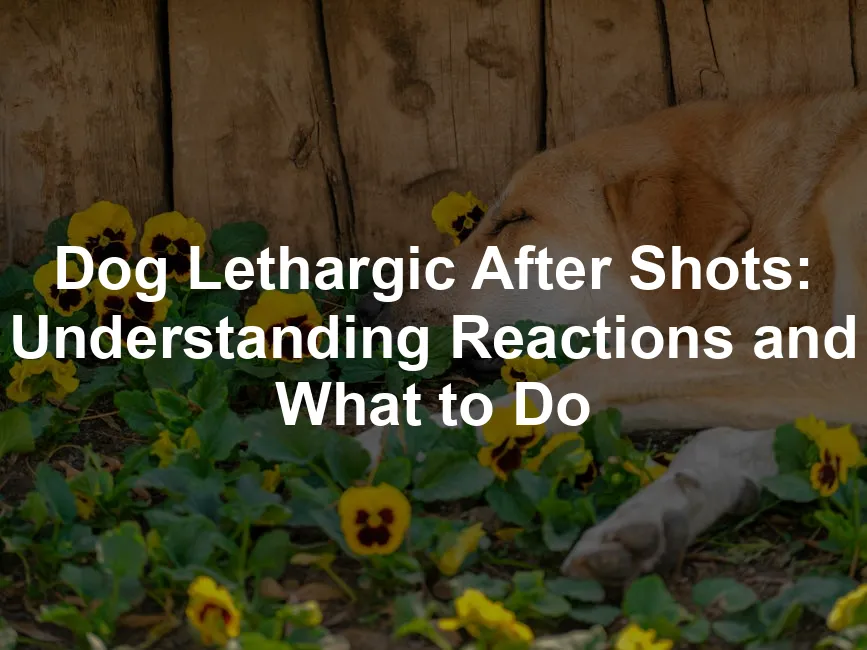Introduction
Vaccinating your dog is vital for their health. Vaccines protect against serious diseases like rabies and parvovirus. However, many pet owners worry about potential reactions. One common concern is lethargy after shots. This article reassures you that some reactions are normal. Keeping an eye on your dog after vaccinations is essential.
To keep track of your dog’s vaccination history, consider using a Dog Vaccination Record Book. This handy tool ensures you never miss a shot and helps you keep your furry friend’s health on track.
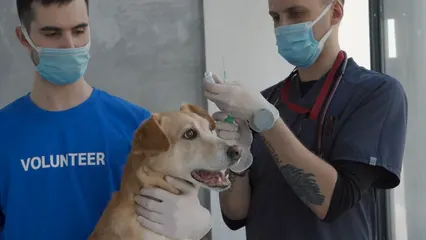
Summary and Overview
In this post, we will discuss key points about vaccine reactions. Understanding these reactions can ease your concerns. Most side effects are mild and temporary. We’ll cover common reactions, severe reactions, prevention strategies, and when to seek veterinary care. With this knowledge, you can better care for your furry friend.
Speaking of care, keeping your dog safe in emergencies is paramount. A Pet First Aid Kit is a must-have for any pet owner. It equips you with essential supplies to address minor injuries and health issues on the spot, ensuring your furry companion gets the care they need when it matters most.
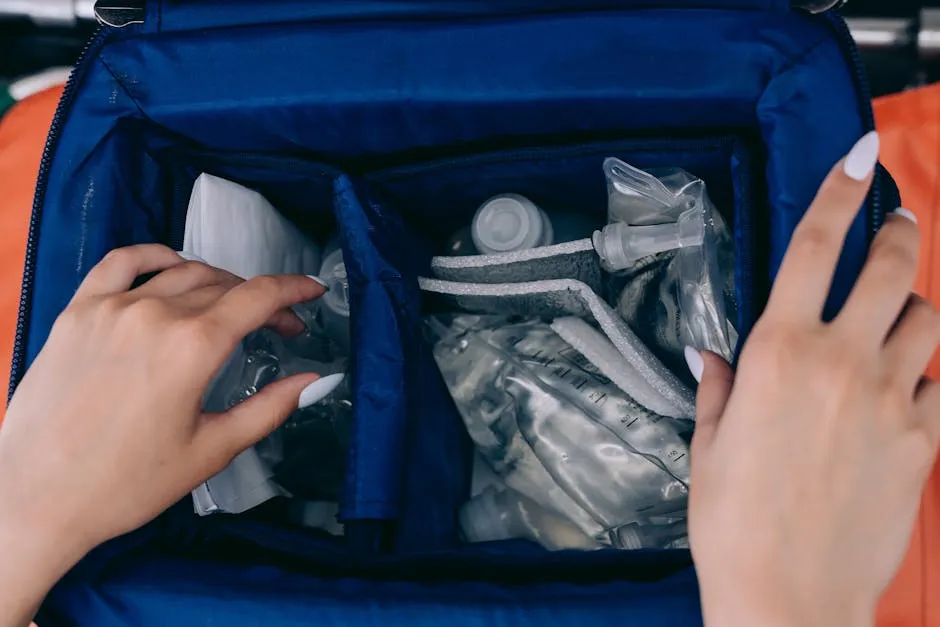
Understanding Dog Vaccinations
Why Vaccinate Your Dog?
Vaccinations are crucial for preventing serious diseases. They help protect not just your dog but also the community. Common vaccines include rabies, parvovirus, and distemper. Statistics show that vaccinated dogs have a significantly lower risk of these illnesses. The benefits of vaccinations far outweigh the risks of potential side effects. For more information on the importance of vaccinations, check out our guide on dog vaccination schedule.
Understanding the vaccination schedule is essential for your dog’s health. dog vaccination schedule
How Vaccines Work
Vaccines play a crucial role in keeping your dog healthy. They stimulate the immune system to recognize and fight off specific diseases. When a vaccine is administered, it introduces a harmless component of the disease. This prompts your dog’s body to produce antibodies, which help fend off future infections.
Adjuvants and preservatives are often included in vaccines. Adjuvants enhance the immune response, making the vaccine more effective. Preservatives ensure the vaccine remains stable and safe. It’s important to know that some dogs may experience temporary behavioral changes post-vaccination. This is typically normal and part of their immune response.
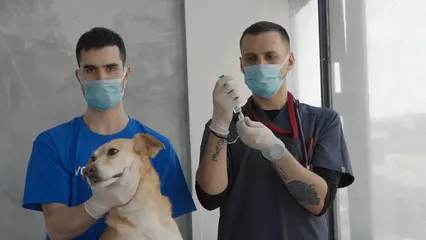
Common Vaccine Reactions
Lethargy After Vaccination
Lethargy is a common reaction after vaccinations. Your dog may seem tired or less active than usual. This response is natural and indicates that their immune system is working. Typically, lethargy lasts about 24 to 48 hours. If your dog remains lethargic beyond this period, it’s a good idea to consult your veterinarian.
Accompanying symptoms may include a mild fever. This is another sign that your dog’s immune system is responding. Keep an eye on your pet and ensure they have a comfortable space to rest.
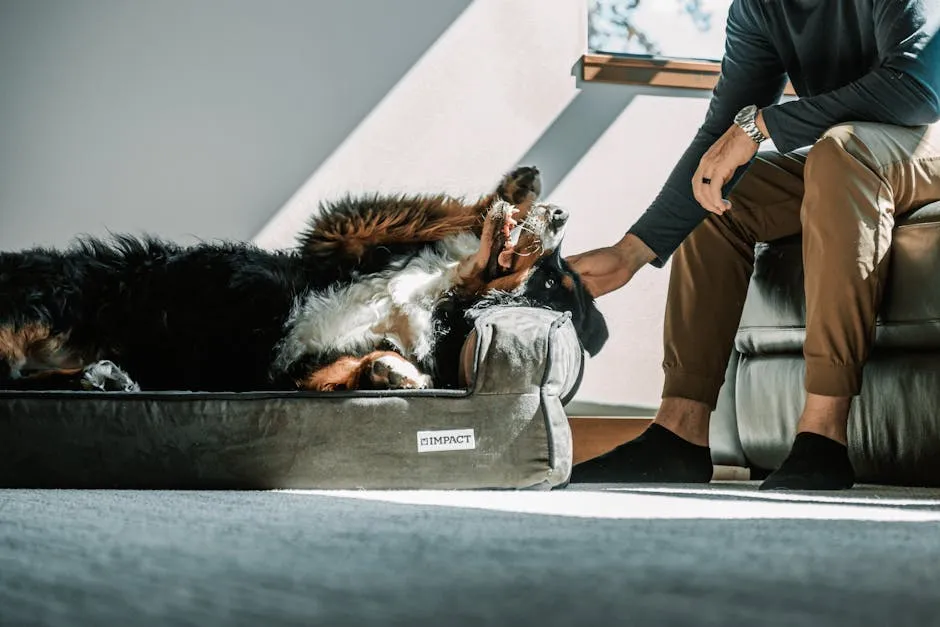
Other Mild Reactions
- Lumps and Bumps
After a vaccine, a small lump may form at the injection site. This happens as your dog’s immune system responds to the vaccine. Monitor the site for swelling, redness, or discharge. These bumps typically resolve on their own but should be checked if they worsen. - Sneezing and Cold-like Symptoms
Vaccines like Bordetella may cause sneezing or nasal discharge. These symptoms are similar to a cold and usually resolve in a couple of days. If your dog shows severe symptoms or doesn’t improve, contact your vet. - Decreased Appetite
Some dogs may eat less after vaccination. This change is often temporary and should resolve quickly. Ensure your dog has fresh water accessible. If the decreased appetite lasts more than a couple of days, consult your veterinarian for advice.

Severe Reactions to Vaccines
Identifying Serious Reactions
While most vaccine reactions are mild, some dogs may experience severe allergies, such as anaphylaxis. This rare but serious condition can occur shortly after vaccination. Watch for symptoms like difficulty breathing, swelling of the face or legs, and hives. If your dog shows any of these signs, seek veterinary attention immediately. Other serious reactions may include persistent vomiting or diarrhea, which can indicate a more severe issue.
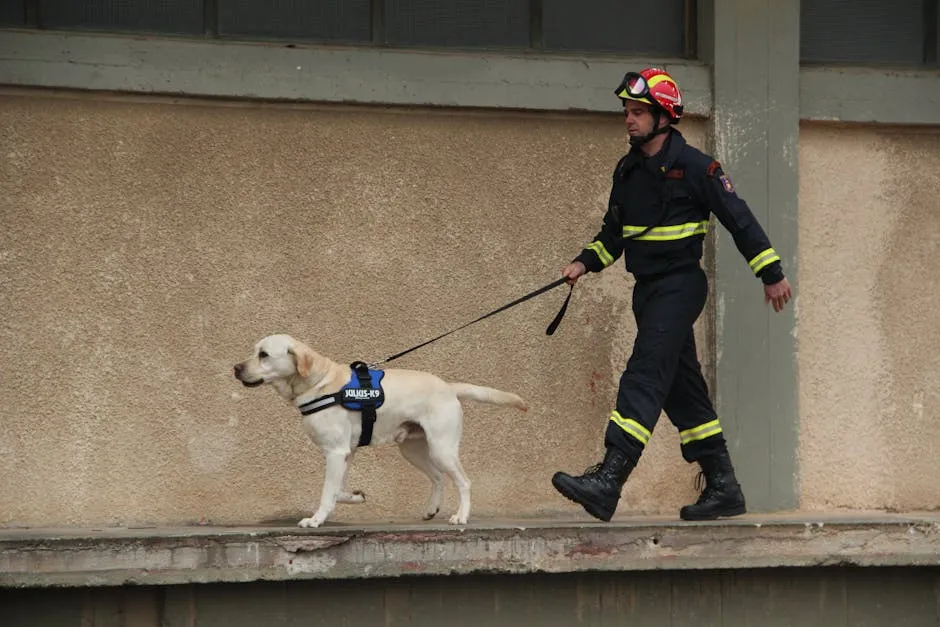
What to Do in Case of Severe Reactions
If you suspect your dog is having a severe reaction, act quickly. First, call your veterinarian or an emergency animal clinic. They can provide guidance on what to do next. If possible, take your dog to the clinic for evaluation. It’s crucial to get your dog examined as soon as possible. Delaying care can lead to worsening conditions. Remember, prompt veterinary attention can save your dog’s life.
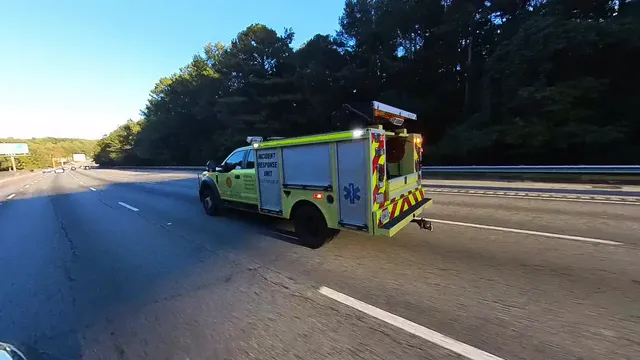
Preventing Vaccine Reactions
Pre-vaccination Considerations
Before vaccinating your dog, inform your veterinarian about any previous reactions. This information is vital for making informed decisions. If your dog has had adverse reactions in the past, your vet may suggest alternatives or modifications. Consider spacing out vaccinations over multiple visits. This strategy can help minimize risks, especially in smaller breeds that may be more susceptible to reactions. Your vet will tailor a vaccination plan that’s right for your dog, enhancing their safety during immunization.
Additionally, it’s wise to have a Dog Grooming Kit on hand. Keeping your dog well-groomed reduces the risk of skin infections and irritations, making it easier for them to handle vaccinations and maintain a healthy coat.
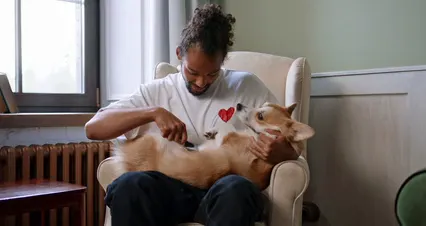
Monitoring Your Dog Post-vaccination
After your dog receives vaccinations, it’s crucial to observe their behavior. Keep an eye on them for the next 24 to 48 hours. This period is when most reactions occur. Look for signs like lethargy, decreased appetite, or any unusual behavior.
Make sure your dog has a comfortable resting area. Encourage them to drink water, as hydration is essential. If they seem unusually tired, allow them to rest without interruption. Monitor their eating habits; a slight decrease in appetite is common.
If their lethargy persists beyond two days, reach out to your veterinarian. Document any changes you notice. This information can help your vet assess your dog’s condition effectively.
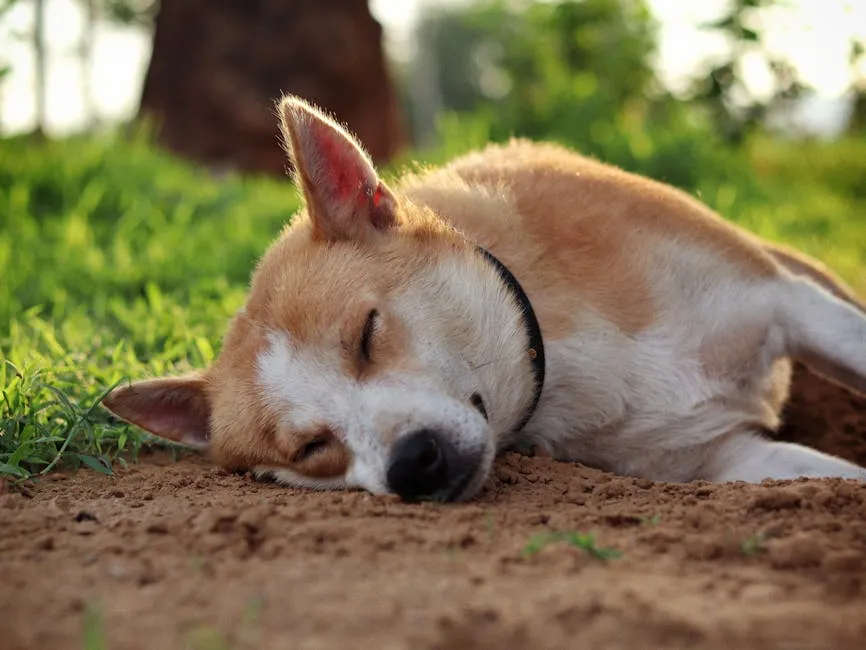
When to Seek Veterinary Care
While mild reactions are common, some signs require immediate attention. If your dog experiences persistent vomiting, difficulty breathing, or swelling, contact your vet right away.
Watch for any severe changes, like excessive lethargy lasting more than 48 hours. These could indicate an allergic reaction or other serious issues. Remember, it’s always better to err on the side of caution.
Normal post-vaccination behavior includes mild lethargy or slight discomfort. However, if your dog shows signs of distress or severe symptoms, it’s time for a vet visit. Trust your instincts; if something feels off, don’t hesitate to seek help.
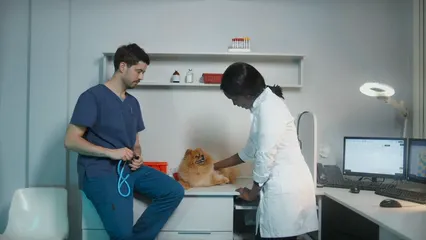
Conclusion
Vaccinations are essential for your dog’s health and well-being. It’s normal for dogs to have mild reactions like lethargy. These symptoms usually resolve quickly. However, understanding what to look for gives you peace of mind. If you have any concerns, reach out to your veterinarian.
Being informed about your dog’s potential reactions helps you provide better care. It also reassures you that you are doing the right thing for your furry friend. Stay vigilant, and don’t hesitate to ask questions. Your dog relies on you to ensure their health and happiness.
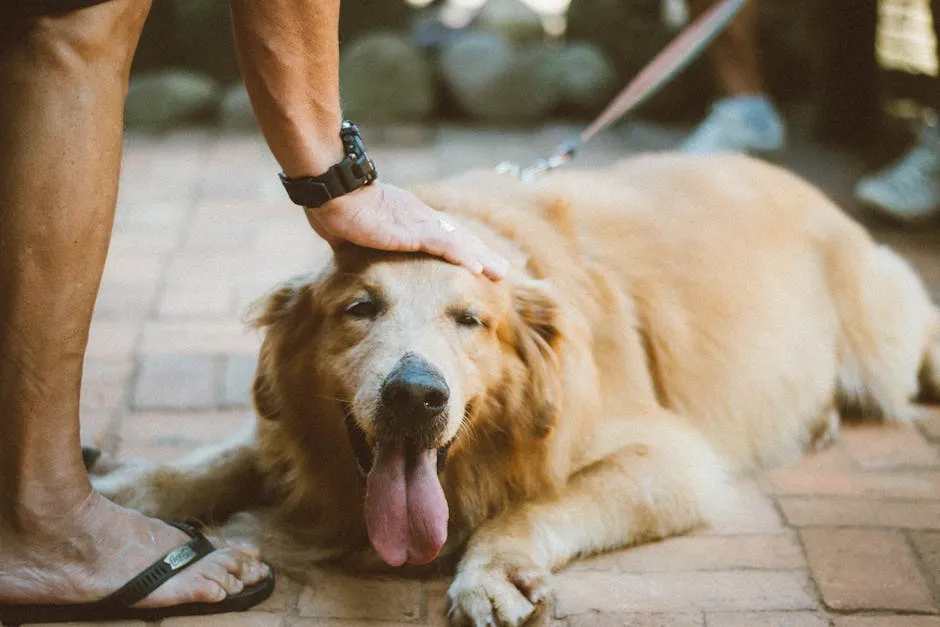
For those long walks, don’t forget to stay hydrated! A Dog Water Bottle for Walking makes it easy to keep your pup hydrated on the go, so you can both enjoy your adventures without worrying about thirst!
FAQs
Is it normal for my dog to be lethargic after vaccinations?
Yes, lethargy is a common response. After vaccinations, your dog may feel tired or less active. This reaction is part of their immune system working. Typically, this lethargy lasts for about 24 to 48 hours. If your dog still seems lethargic after this period, it’s wise to consult your veterinarian.
How long should I wait before contacting a vet about my dog’s reaction?
Monitor your dog closely for 24 to 48 hours after vaccination. This timeframe is crucial, as most mild reactions occur during this period. If symptoms persist or worsen beyond this timeframe, reach out to your vet for guidance and reassurance.
What should I do if my dog has a severe reaction to a vaccine?
If you notice severe symptoms like difficulty breathing, swelling, or vomiting, seek immediate veterinary help. Call your vet or an emergency animal clinic right away. Quick action can be critical in these situations, as severe reactions can escalate rapidly.
Can I prevent my dog from reacting to vaccines?
While you cannot eliminate all risks, you can take steps to minimize them. Inform your veterinarian about any previous reactions. They may recommend spacing out vaccines or using antihistamines beforehand. These strategies can reduce the likelihood of adverse reactions.
Are certain dogs more prone to vaccine reactions?
Yes, some dogs may be more susceptible to reactions. Factors include breed, age, and overall health. For instance, smaller breeds can have higher risks with multiple vaccines given at once. Always discuss your dog’s unique circumstances with your veterinarian for tailored advice.
Key Takeaways
– Lethargy after vaccinations is common and usually temporary.
– Monitor your dog for 24 to 48 hours post-vaccination.
– Seek immediate help for severe reactions.
– Preventative measures can help reduce risks.
– Certain breeds may be more prone to reactions; consult your vet for specifics.
Please let us know what you think about our content by leaving a comment down below!
Thank you for reading till here 🙂

And remember, a comfortable dog is a happy dog! If your pup needs a cozy place to rest, check out a Dog Bed with Orthopedic Support. It’s perfect for giving your furry friend the restful sleep they deserve!
For those who love to travel, a Pet Carrier Backpack can be a game changer. It allows you to take your dog along on adventures while keeping them comfortable and secure.
Lastly, don’t forget to stock up on Dog Waste Bags with Dispenser. They make clean-up a breeze, ensuring you leave no trace behind during your outings!
All images from Pexels

